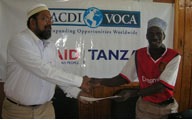
Developing Economically Viable & Environmentally Sustainable Income-Generating Activities
ACDI/VOCA has helped coastal villagers in the Tanga region of Tanzania increase their incomes through the sustainable use and management of the natural resources on which they depend. The four-year USAID-funded Sustainable Environmental Management through Mariculture Activities (SEMMA) project worked to conserve biodiversity along the Tanzanian coastline through the sustainable development of profitable mariculture enterprises.
SEMMA built on the successes of ACDI/VOCA’s previous project, the Smallholder Empowerment and Economic Growth through Agribusiness and Association Development project, which was instrumental in linking sustainable environmental management to economic growth and poverty alleviation. By transforming coastal villagers from casual laborers to mariculture entrepreneurs and fostering a sense of community stewardship of resources, SEMMA joined the goals of conservation and poverty alleviation, with an emphasis on civil society capacity building to improve governance.
SEMMA’s principal objectives were to
- establish and strengthen conservation enterprises that generate increased and equitable benefits from the sustainable use of natural resources
- strengthen the capacity of small-scale mariculture producers to practice participatory landscape-scale conservation
- facilitate the application of policies and laws that integrate conservation and development by all stakeholders in the mariculture subsector
ACDI/VOCA supported a variety of mariculture activities, including seaweed farming, lobster sheltering and mud crab fattening. Mud crab fattening and lobster sheltering were new activities in Tanzania that were introduced to coastal communities with ACDI/VOCA’s support. These activities enabled smallholders to increase their incomes while playing an active role in conserving and sustaining the very resource base on which they rely.
ACDI/VOCA provided assistance in various areas, including technical support, to enable smallholders to improve their production practices and enhance efficiency in resource use and overall productivity. To help smallholders achieve economies of scale, ACDI/VOCA provided training in association building and management, business planning and product marketing.
SEMMA activities were also geared toward enabling smallholders to establish mutually beneficial long-term business relationships with lead firms, mainly exporters. This guarantees them a market for their goods and creates opportunities for smallholders to tap into other benefits such as credit provision and technical assistance provided as embedded services by the exporters.
SEMMA incorporated cross-cutting themes of gender equity, capacity building, communications and public-private alliance tools by
- providing financial incentives for biodiversity conservation
- focusing on economic activities that include large numbers of women in order to maximize food security and poverty alleviation
- strengthening existing economic activities to enable quick impact and create project momentum
- developing transferable business skills to increase diverse livelihood income streams
Through SEMMA, ACDI/VOCA sought to substantially increase the incomes of some of Tanzania’s poorest communities, resulting in poverty reduction and increased food security for at least 10,000 people in the coastal region of Tanga. In addition, the SEMMA project contributed to the USAID mission’s health, HIV/AIDS, and democracy and governance strategic objectives by strengthening civil elements of the communities and sustaining economic empowerment for smallholders, particularly women who made up about 80 percent of project beneficiaries.


